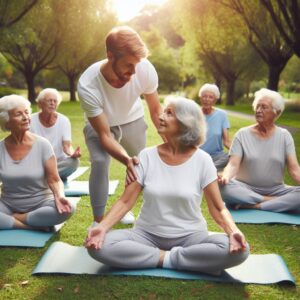One foundational principle of holistic health is the interconnection between the mind and body. Stress, anxiety, and negative emotions can manifest as physical symptoms. Physical ailments can affect one’s mental health. For seniors, finding activities that promote mind-body harmony is necessary. Yoga and Tai Chi combine physical movement, breath control, and meditation, helping to reduce stress, improve flexibility, and enhance mental clarity.
The Power of Nutrition
Seniors may find their metabolism slowing down, their ability to absorb certain nutrients diminishing, or their appetite decreasing. These factors necessitate a tailored approach to diet that focuses on nutrient-dense foods to meet their body’s requirements without excessive caloric intake.
Calcium and Vitamin D are important for maintaining bone health and reducing the risk of osteoporosis and fractures. B Vitamins, especially B12, are important for keeping the body’s nerve and blood cells healthy, thus preventing medical conditions like anemia. Omega-3 fatty acids, found in fish and flaxseeds, are beneficial for heart health, potentially reducing the risk of heart disease.
Fiber plays a significant role in the senior diet, aiding digestion and preventing constipation, a common issue in older adults. It helps in maintaining a healthy weight and can reduce the risk of chronic diseases such as type 2 diabetes and heart disease. Encouraging the intake of fruits, vegetables, and whole grains can help ensure adequate fiber consumption.
With age, the body’s sense of thirst may diminish, making dehydration a risk. Drinking adequate amounts of fluids, preferably water, throughout the day is necessary to avoid dehydration and its detrimental effects on health, including urinary tract infections and kidney problems.
Older adults face unique challenges that can hinder their nutritional intake, such as decreased mobility, dental issues, medication side effects, and diminished sense of taste or smell, making food less appealing. Solutions can include preparing easy-to-eat, nutrient-rich meals, enhancing flavors with herbs and spices instead of salt, and, if necessary, discussing medication side effects with a healthcare provider. A dietitian or nutritionist specializing in aging can offer invaluable advice, tailoring dietary plans to individual health conditions, dietary restrictions, and preferences.
The Healing Touch of Massage
Regular massage sessions can lead to significant improvements in pain levels, reducing reliance on medications, which often come with undesirable side effects. Massage therapy improves circulation. This enhanced blood flow is important for seniors, as it speeds up the recovery of musculoskeletal injuries and improves overall cardiovascular health.
As the body ages, joints can become less flexible, and muscles may lose their elasticity and tone. Massage therapy works to combat these trends by maintaining and improving range of motion and flexibility. Through specific techniques that stretch the muscle fibers and promote tissue elasticity, seniors can experience an improvement in their mobility. This enhancement in flexibility and range of motion helps in reducing the risk of falls and injuries.
For seniors, who may experience loneliness, depression, or anxiety, massage can offer a comforting touch. This interaction helps release endorphins, the body’s natural “feel-good” hormones, thereby alleviating stress and promoting a sense of calm and well-being. Massage can improve sleep quality, an important factor in maintaining cognitive function and overall health.
Massage therapy can aid in enhancing skin health by improving circulation, resulting in better oxygen and nutrient delivery to the skin. The use of nourishing oils or lotions during massage encourages the regeneration of cells, giving the skin a healthier appearance.
Before integrating massage into a senior’s health regimen, it is advisable to consult with healthcare providers. This ensures that massage therapy complements existing medical treatments and is aligned with the individual’s health requirements.
Acupuncture
 The World Health Organization and various national health institutes recognize acupuncture as a beneficial treatment for numerous health issues, including chronic pain, arthritis, and headaches. This acknowledgment underscores acupuncture’s relevance and applicability in contemporary medicine, especially in addressing ailments common in the senior population.
The World Health Organization and various national health institutes recognize acupuncture as a beneficial treatment for numerous health issues, including chronic pain, arthritis, and headaches. This acknowledgment underscores acupuncture’s relevance and applicability in contemporary medicine, especially in addressing ailments common in the senior population.
For older adults dealing with chronic pain conditions such as arthritis or neuropathy, acupuncture can provide substantial relief by stimulating the body’s natural painkillers and reducing inflammation.
Acupuncture has been shown to improve sleep quality, addressing issues like insomnia—a condition that frequently affects older adults. By promoting relaxation and regulating the body’s sleep-wake cycle, acupuncture can help seniors achieve more restful and rejuvenating sleep.
Preliminary studies suggest that acupuncture may mitigate cognitive decline by improving cerebral blood flow, thereby offering a promising approach to managing symptoms of conditions like dementia in older adults.
Acupuncture can contribute to improved digestion and a stronger immune system. Stimulating specific body points, can enhance gastrointestinal function and boost the body’s defense against illnesse.
A professional acupuncturist will conduct a thorough assessment before treatment, taking into account the senior’s medical history, current medications, and specific health needs.
Acupuncture should not be viewed as a substitute for conventional medical care but rather as a complementary therapy. Seniors and their healthcare providers must communicate openly about the use of acupuncture. This ensures that acupuncture is integrated safely into the individual’s overall healthcare plan, optimizing health outcomes and enhancing the quality of life.
The Role of Herbal Remedies
Herbal remedies involve the use of plant-based materials, including leaves, roots, berries, and flowers, to prevent or treat specific health conditions. These natural substances are believed to contain active compounds that can positively influence health, either through supporting the body’s natural healing mechanisms or providing symptomatic relief for various ailments.
The integration of herbal remedies into contemporary healthcare underscores the growing appreciation for their role in enhancing treatment outcomes and promoting overall well-being. The effectiveness and safety of herbal remedies can vary, and their interaction with prescription medications is a critical consideration, particularly for seniors who may be managing multiple health conditions.
 The interaction between herbal compounds and pharmaceuticals can lead to adverse effects or diminish the efficacy of conventional medications. Seniors need to consult healthcare professionals before incorporating herbal remedies into their health regimen. A practitioner skilled in both conventional and holistic medicine can provide critical guidance, ensuring that the use of herbal remedies complements existing treatments safely and effectively.
The interaction between herbal compounds and pharmaceuticals can lead to adverse effects or diminish the efficacy of conventional medications. Seniors need to consult healthcare professionals before incorporating herbal remedies into their health regimen. A practitioner skilled in both conventional and holistic medicine can provide critical guidance, ensuring that the use of herbal remedies complements existing treatments safely and effectively.
Physical activities keep the body strong, improve heart health, and even boost mood through the release of endorphins. The key is finding enjoyable activities that suit one’s fitness level and abilities. Regular physical exercise also promotes independence.
Engaging in cognitive activities such as reading, puzzles, or learning new skills can ward off mental decline. Memory care facilities and senior centers often offer programs designed to stimulate cognitive health, but even simple daily habits can make a difference. Encouraging curiosity and creativity keeps the brain active and engaged.
Spirituality provides comfort, a sense of purpose, and a connection to a larger existence. Activities like nature walks, journaling, or meditation can nurture the spiritual side, offering peace and fulfillment.